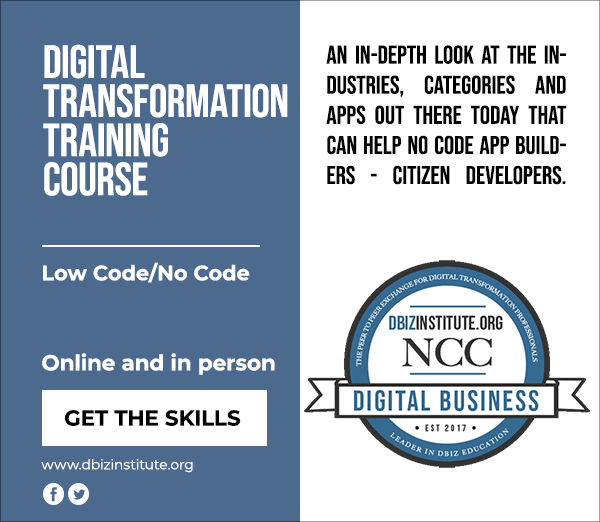
Low Code/No Code: The Good, The Bad and The Challenging
Course Availability
Description
Low Code/No Code: The Good, The Bad and The Challenging – Face-to-Face
$1,195.00
Low Code/No Code empowers Citizen Developers and enhances IT productivity. However, to succeed, its challenges need to be addressed through pragmatic best practices.
Low Code/No Code empowers Citizen Developers and enhances IT productivity. However, to succeed, its challenges need to be addressed through pragmatic best practices.
If you’re a business or technology professional looking to respond to customer needs quicker, Low Code No Code (LCNC) is an enabler for you.
Maybe you have a small IT department or maybe they’re too busy to help you when you need it. Learn how to use cloud-based apps and no code apps to learn ways to respond to customer needs quicker. To model concepts faster. To build MVPs and prototypes faster. To automate your processes efficiently.
This course provides an in-depth look at the industries, categories and apps out there today that can help no code app builders – citizen developers. You’ll come away with a good understanding of various Low Code/No Code categories (BPM, Database, Integration, Web, Mobile) for innovative and accelerated application development. And you’ll get hands-on experience with many cloud-based apps.
There is an explosion of Low Code/No Code tools and platforms. However, it is a confusing and fragmented market. This course provides you with a roadmap to understand and succeed with Low Code/No Code. It will delve into the various categories of Low Code/No Code, the ROI advantages of Low Code/No Code, and the Cultural changes that are catalyzed by Low Code/No Code.
Low Code/No Code helps organizations build innovative applications in Web, Mobile, and others. Low Code/No Code platforms can be process-centric (BPM), data-centric, integration-centric, etc. A simple example includes converting some of your existing MS Office assets like spreadsheets and MS Access databases into an app using Low Code/No Code.
The course will delve into the advantages of Low Code/No Code in achieving accelerated development of Minimum Viable Products (MVPs), with several examples and illustrations of Low Code/No Code platforms.
The course will also elaborate on some of the difficult practices with Low Code/No Code: what to look for and how to avoid the hype – the Low Code/No Code challenges. Typically complex solutions will involve multiple Low Code/No Code and coding platforms.
The course will expand on the empowerment of Citizen Developers who leverage No Code planforms and the productivity gains of IT. Low Code/No Code is a Cultural transformation.
Outline
- Introduction to Low Code/No Code
- Low Code vs. No Code vs. Pro Code
- What are the Advantages of Low Code/No Code (the “Good”)?
- Who benefits from Low Code/No Code and why (also the “Good”)?
- What are the Potential Pitfalls of Low Code/No Code (the “Bad”)?
- What are the Challenges of Low Code/No Code?
- The Low Code/No Code Ecosystem
- Why Multiple Low Code/No Code/Pro Code platforms for complex applications?
- Low Code/No Code Culture: Citizen Developers and Citizen Data Scientists
- IT Productivity with Low Code/No Code
- Prototyping, Minimum Viable Products and Design Thinking with Low Code/No Code
- Conclusions & Where to Start
- Help understand the Low Code/No Code ecosystem
- Have a good appreciation of the advantages but also weaknesses and challenges of Low Code/No Code
- Learn who is the Citizen Developer and what are the Cultural ramifications
- Help leverage productivity enhancements for IT developers
- Understand the leading tools and platforms of Low Code/No Code
- Help understand and contrast “Low Code” vs. “No Code” vs. “Pro Code”- for developing enterprise applications
- Have a good understanding of various Low Code/No Code categories (BPM, Database, Integration, Web, Mobile) for innovative and accelerated application development
- Learn how to create and deploy Minimum Viable Products with Low Code/No Code
The Low Code/No Code is the most important Digital Transformation trend. However, its ecosystem is a fragmented market with hundreds of platforms and solutions. This course will provide a holistic and pragmatic roadmap to leverage the advantages of Low Code/No Code while avoiding potential roadblocks and challenges. The course also highlights the cultural transformation with Citizen Developers and unprecedented IT productivity.
- Chief Operations Officer (COO – or equivalent)
- Chief Information Officer
- Chief Innovation Officer
- VP of Product Management
- VP of Professional Services
- VP of Enterprise Architecture
- Chief Digital Transformation Officer
- Chief Technology Officer
- VP of Development
- Industry Principals / Subject Matter Experts
- VP of Web & Mobile Application Development















